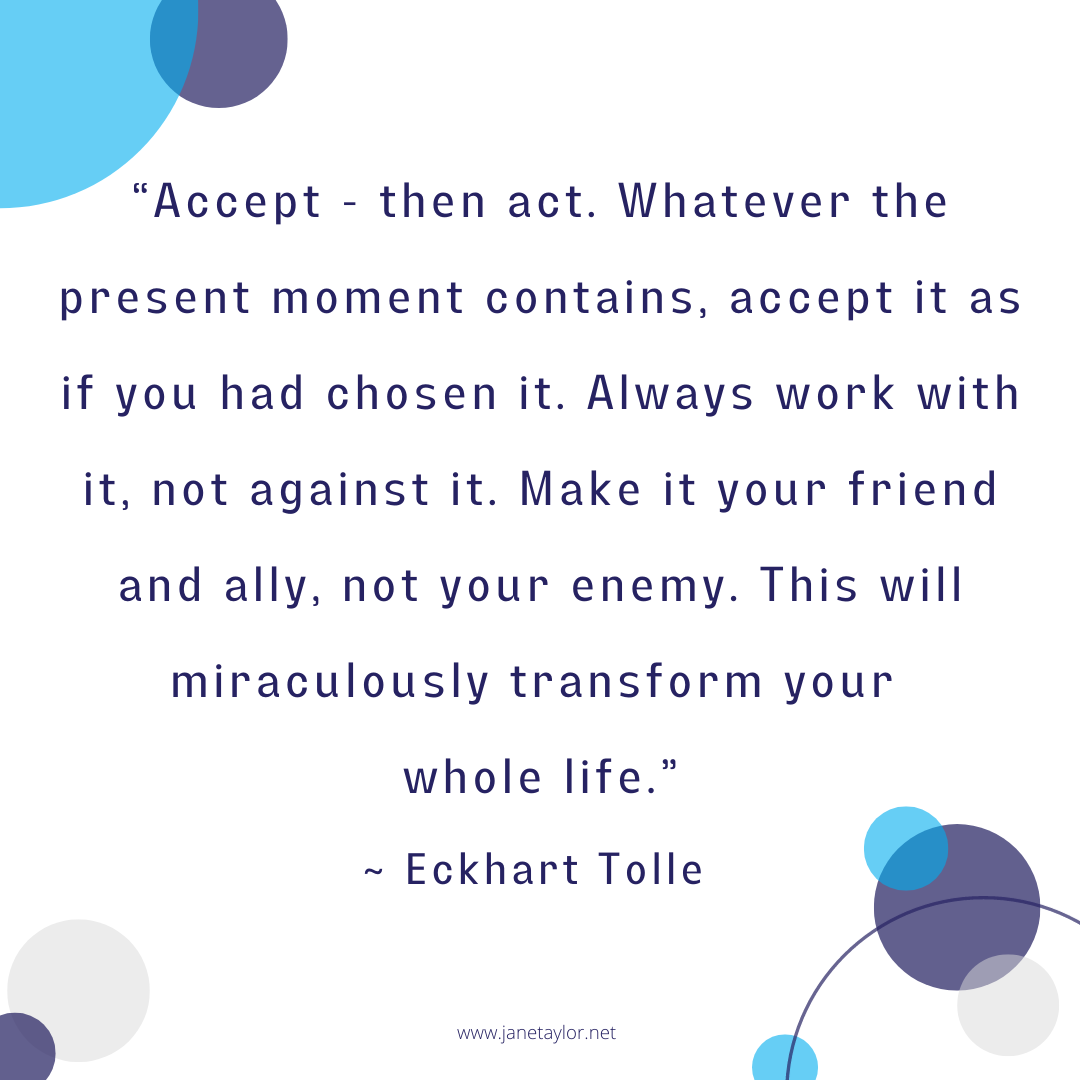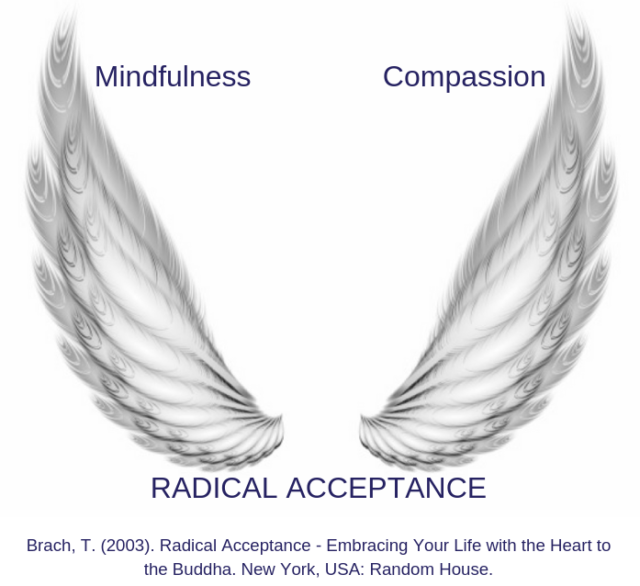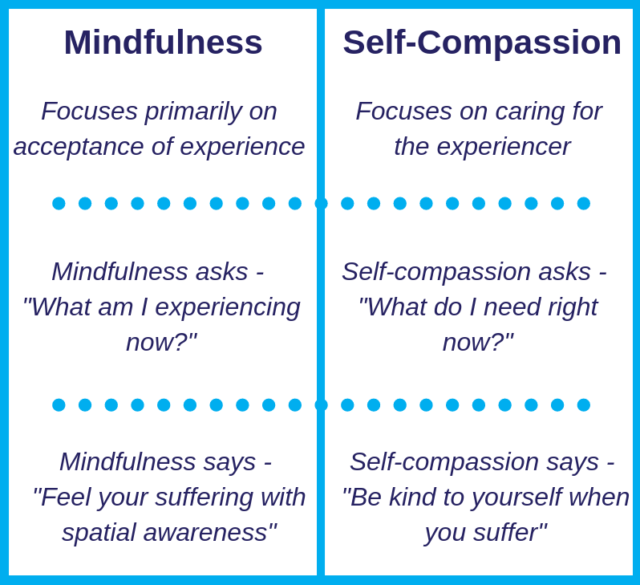The Gift of Radical Acceptance

As identified yesterday, I have decided this year is the year of radical acceptance. After teaching mindfulness for a while and also self-compassion, I wanted to focus on and practise radical acceptance this year for a few reasons (maybe I will share that one day). However, today I wanted to share with you the gift a radical acceptance.
What is Radical Acceptance?
One of the clearest ways I have seen radical acceptance explained is by Tara Brach. She refers to the interconnectedness of mindfulness and compassion as radical acceptance. Brach uses the metaphor of a bird which has two wings – where one wing of the bird is clear seeing (i.e. mindfulness) and the other is our capacity to relate in a tender and sympathetic way to what we perceive (i.e compassion).

What is Mindfulness?
Mindfulness is often referred to as the opposite of resistance. Mindfulness in everyday life is the ultimate challenge and practice. It is a way of being, of seeing, of tapping into the full range of our humanity – often seen in playful children fully experiencing life in the here and now. There are a number of definitions of mindfulness, including one of the most famous ones by Jon Kabat-Zinn (1994) –
“as paying attention in a particular way: on purpose, in the present moment and non-judgementally” (p.4).
Bob Stahl and Elisha Goldstein (2010) report “in Sanskrit, it’s known as smrti, from the root word smr, meaning “to remember” and in Pali, the language of the earliest Buddhist scriptures, it’s known as sati (mindfulness)” (p.15).
What is Compassion?
There are a number of definitions on compassion, including –
- “We define compassion as the feeling that arises in witnessing another’s suffering and that motivates a subsequent desire to help.” ~ Goetz, Keltner & Simon-Thomas
- “…the desire to remove suffering from the other person” ~ Thich Nhat Hanh
- “the wish that all sentient beings be free from suffering.” ~ Dalai Lama
Now if we shift this focus to the self in relation to compassion, the definition of self-compassion follows.
What is Self-Compassion?
There are a number of well-known definitions on self-compassion. Christopher Germer in his book The Mindful Path to Self-Compassion: Freeing Yourself from Destructive Thoughts and Emotions refers to self-compassion as
“… simply giving the same kindness to ourselves that we would give to others.”
In Dr Kristin Neff’s book – Self-Compassion: Stop Beating Yourself Up and Leave Insecurity Behind, she talks about
“Self-compassion entails three core components. First, it requires self-kindness, that we be gentle and understanding with ourselves rather than harshly critical and judgmental. Second, it requires recognition of our common humanity, feeling connected with others in the experience of life rather than feeling isolated and alienated by our suffering. Third, it requires mindfulness – that we hold our experience in balanced awareness, rather than ignoring our pain or exaggerating it. We must achieve and combine these three essential elements in order to be truly self-compassionate.”
Mindfulness and Self-Compassion Working Together…
We need mindfulness and compassion to work together – mindfulness helps to ensure that self-compassion isn’t used as a form of resistance and we need self-compassion to feel safe enough to open mindfully to difficult experiences. The following graphic shares some insights in to mindfulness and self-compassion –

Over to You…
Can you see the gift of radical acceptance? Do you have any questions? If so, please leave them below
What is your word for the year? If you don’t have one yet, you can see the process here. Ready to reconnect with your heart and start living a more connected and whole-hearted life? Then click here to receive the toolkit 🙂
References –
Brach, T. (2003). Radical Acceptance – Embracing Your Life with the Heart to the Buddha. New York, USA: Random House.
Germer, C. (2009). The Mindful Path to Self-Compassion: Freeing Yourself from Destructive Thoughts and Emotions. New York: Guilford Press.
Goetz, J. L., Keltner, D., & Simon-Thomas, E. (2010). Compassion: an evolutionary analysis and empirical review. Psychological bulletin, 136(3), 351–374. doi:10.1037/a0018807
Kabat-Zinn, J. (1994). Wherever You Go, There You Are – Mindfulness Meditation in Everyday Life. New York, USA: Hyperion.
Neff, K. (2011). Self-Compassion: The Proven Power of Being Kind to Yourself. New York, USA: HarperCollins Publishers.
Nhat Hanh, T. (2007). Teachings on Love. California, USA: Parallax Press.
Stahl, B., & Goldstein, E. (2010). A Mindfulness-Based Stress Reduction Workbook. Oakland, USA: New Harbinger Publications, Inc.
